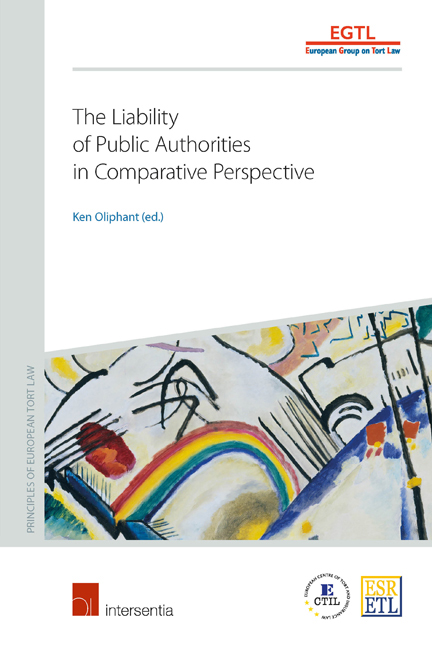Book contents
- Frontmatter
- Preface
- Contents
- List of Authors
- Introduction
- Questionnaire
- PART I PUBLIC AUTHORITY LIABILITY OUTLINED
- PART II CASE STUDIES
- Case 1 Negligent Safety Certification (Maladministration)
- Case 2 Wrongfully Cancelled Licence (Improper Administrative Decision)
- Case 3 Missing Warning (Improper Administrative Omission – Omission following Prior Creation of Risk)
- Case 4 Fireworks Store (Improper Administrative Omission – Pure Omission)
- Case 5 Unfounded Criminal Charges (Prosecutorial and Judicial Acts)
- Case 6 Unpasteurised Cheese (Possibly Improper Regulatory Act – Improper Regulatory Omission)
- Case 7 Police Cross-fire (Properly Conducted Administrative Activities)
- PART III CONCLUSIONS
Case 3 - Missing Warning (Improper Administrative Omission – Omission following Prior Creation of Risk)
from PART II - CASE STUDIES
Published online by Cambridge University Press: 27 November 2017
- Frontmatter
- Preface
- Contents
- List of Authors
- Introduction
- Questionnaire
- PART I PUBLIC AUTHORITY LIABILITY OUTLINED
- PART II CASE STUDIES
- Case 1 Negligent Safety Certification (Maladministration)
- Case 2 Wrongfully Cancelled Licence (Improper Administrative Decision)
- Case 3 Missing Warning (Improper Administrative Omission – Omission following Prior Creation of Risk)
- Case 4 Fireworks Store (Improper Administrative Omission – Pure Omission)
- Case 5 Unfounded Criminal Charges (Prosecutorial and Judicial Acts)
- Case 6 Unpasteurised Cheese (Possibly Improper Regulatory Act – Improper Regulatory Omission)
- Case 7 Police Cross-fire (Properly Conducted Administrative Activities)
- PART III CONCLUSIONS
Summary
E, cycling on a winding public cycle path crossing private property, comes around a sharp bend, only to find that the path suddenly narrows and that there is a cyclist coming the other way. Neither cyclist is able to see the other until the last moment because of a wall at the side of the cycle path. To avoid a collision, E rides off the path onto rough ground, goes over a concealed hole, is thrown from her bike and suffers serious injuries. Previously, a warning that the cycle path narrows suddenly into one lane was painted on its surface just before the bend, but this had been covered by tarmac following repair works, and F, the responsible public authority, had failed to re-paint the warning notwithstanding the lapse of several months and its admitted knowledge that this section of the cycle path was potentially dangerous. It now defends its inaction on the basis of a drastic cut in its public funding, in consequence of which it resolved to defer all spending on cycle paths so as to concentrate on higher spending priorities. E sues F (and/or the State) for damages, alleging that F ought to have re-painted the warning and that she would have slowed down and avoided the accident if this had been done.
AUSTRIA
Austrian case law holds that the failure to erect mere warning signs are not acts of authority, but rather concern a private law duty of the road owner to safeguard traffic, as they do not order some kind of specific conduct of the road users, but merely inform them of dangers. Consequently, public authority liability under the AHG cannot arise. This does not necessarily leave victims uncompensated, however: they may still be indemnified under §1319a ABGB, which provides for a special liability of the keeper of a road, but only if he or his auxiliaries acted with at least gross negligence. If the road is owned and/or maintained by a public law entity, it may also be held liable under said provision for failure to maintain its roads or the signs erected upon them, but only with respect to its private law duties as a road owner (or keeper) and irrespective of any authority attributed to it.
- Type
- Chapter
- Information
- The Liability of Public Authorities in Comparative Perspective , pp. 699 - 730Publisher: IntersentiaPrint publication year: 2016



